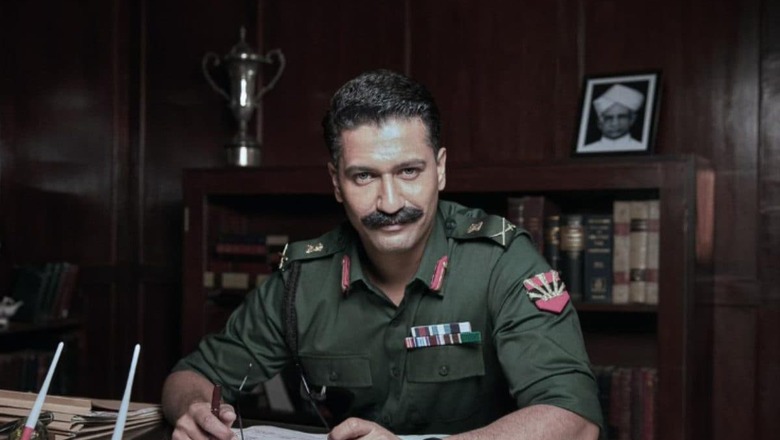
views
Our stories drive our heritage. Our heroes shape our thoughts and lifestyles. Bharatiya cinema has mostly romanticised criminals, mafias, dacoits and other vile elements of the society and many times justified violence, loot, and theft as heroic acts, relating it to a highly debatable English character called Robinhood. From creating larger-than-life characters for mafias like Dawood Ibrahim and Haji Mastan to scripting shows and cinema for Abdul Karim Telgi and Natwarlal, the industry directly or indirectly promoted the rogue elements of the society.
The industry, over the last seven decades, weaved stories around a set of people who shouldn’t be given fame and larger-than-life characterisation. But seldom has the film industry showcased real heroes of our history in the most glorious manner. Slowly but steadily, this trend has started to change. A pivotal landmark in this voyage of change is ‘Sam Bahadur’. A film that tells the tale of Field Marshal Sam Hormusji Framji Jamshedji Manekshaw MC (Sam Manekshaw).
It is delightful to see Hindi cinema shunning its fetishes with vile characters and showcasing the life of someone as great as Sam Manekshaw. There is a lot to take away from the film and the life story of Sam Manekshaw is likely to inspire generations. Hence, it is very important to congratulate and commend the makers of the film for taking up such a subject and delivering it with such honesty. This movie is likely to serve as a milestone for filmmakers who wish to create cinema on great individuals born in this nation.
Let’s understand the different aspects of the film to absorb the great endeavour of the filmmakers of ‘Sam Bahadur’.
The film traces the journey of Sam Manekshaw from his cadet days to him becoming the first Field Marshal of Bharat. It captures all the important events, from Sam Manekshaw getting shot in World War II to his friendship with Yahya Khan, from his understanding of partition to his involvement in the Indo-China War of 1962, from his closeness to Jawaharlal Nehru and Indira Gandhi to his tough decisions in the Indo-Pak War of 1971. The film is gripping and comes out as very authentic, real and honest. It gives a clear insight into the thought process, courage, wit and decision-making of the great Sam Manekshaw.
Seeing the grit, intelligence and preparedness of the great man is an overwhelming experience. His witty one-liners are a standout. His life journey as portrayed on screen is a testament to how great men think. The audience takes back a lot of positives from the theatre from his life experiences.
Let’s understand the technical aspects of the cinema.
First and foremost, the portrayal of Sam Manekshaw by Vicky Kaushal is for the ages. It’s an acting masterclass. I don’t have words to describe what Vicky Kaushal has pulled off. We only see Sam Manekshaw on screen. There is not a single frame where he has left the character. We don’t just watch but we feel Sam Manekshaw on screen. Institutes can train students using this portrayal of Kaushal. I can go on and on by adding more adjectives about the actor but it won’t suffice.
Moving on, the acting of other characters is also good. The portrayal of Sam Manekshaw’s wife by Sanya Malhotra is mesmerising. She brings that calmness and poise to the character. The portrayal of Yahya Khan by Mohammed Zeeshan Ayyub also leaves an indelible mark. The cinematography of the film is good. The scenes look real and apt to those times. The frames are beautifully captured. The direction of the film is good. It takes a lot of courage to bring the life of someone as great as Sam Manekshaw on screen and Meghna Gulzar deserves all the credit for it.
The background score as well as the limited songs put in the cinema are exemplary and fit perfectly. They add to the presence of on-screen characters and touch the heart and soul of the audience. The songs written by Gulzar ji are soulful and necessitate multiple hearing. The songs ‘Banda’ and ‘Badhte Chalo’ are really special and fill one’s heart with pride while hearing, giving you goosebumps of high octane. Also, whenever the military scenes are shown, we can witness the perfection of minute detailing. The production design is completely outstanding.
However, there are some flaws as well. The screenplay and script could have been better. The film doesn’t weave properly all the incidents in the life of Sam Manekshaw in the form of a well-knit story but passes on from one incident to another, sometimes rather superficially. Also, the editing could have been better. Some scenes are unnecessary and unwanted in the beginning, they neither bind the story together nor create a connection with the audience.
The film would have been ten times more engaging if the story and subplots were better merged. Also, the ending war of 1971 could have been captured as a full-scale war scene though I understand the price it comes with for production. 1971 was not just the greatest year in Sam’s life but also in world history as well as our own Bharatiya history. The film could have shown it with a lot more focus.
The roles of all three forces in the war could have been highlighted a little more. Also, the film could have captured how Sam handled the war room tactically and strategically. It would have given the audience more insight into the importance of winning such a war. A full-scale war sequence would have given the audience the necessary concluding rush that the film demanded. Moreover, the character of Indira Gandhi played by Fatima Sana Shaikh fitted aptly for the young age but required more prosthetics and makeup at the older age to make it appear more like Indira Gandhi.
Some subplots were lost. The film establishes the friendship between Sam Manekshaw and Yahya Khan but doesn’t showcase the rivalry between the two during the 1971 war. A little more screen time on this issue would have been helpful. But, in spite of such nitpicking, the film is brilliant and offers a very engaging viewing. It leaves the audience satiated with the greatness of the first Field Marshal.
The overall beauty of the film lies in its ability to capture important moments from the life of Sam Manekshaw. Multiple moments in the film leave the audience spellbound. It captures the different aspects of the personality of Sam Manekshaw through these moments. The film shows the courageous personality of Sam Manekshaw in its initial moments where he forces his friends to stay outside the defence academy beyond the allowed time, not fearing punishment or the repercussions of his decision. The same courage is also shown when he motivates his Sikh troops in World War II when they are exhausted after not sleeping for four nights and have just lost 50 fellow troops.
The verses of the Gurbani ‘soora so pehchaniye jo lade deen ke het, Purja purja kat mare kabhu na chaddhe khet’ iterated while motivating the Sikh troops sends shivers down the spine. Manekshaw’s courage is also displayed in the way he deals with Indira Gandhi. The scene where he contradicts Gandhi’s statement on the duty of army men to die for the nation by saying ‘soldiers ki duty hai desh ki raksha ke liye dushman ki jaan lena’ comes across as a testament of his courage in speaking out the right thing. There are multiple incidents in the film where Sam Manekshaw appears to contradict Smt. Indira Gandhi, thereby persuading her to do the right thing. The wit of Manekshaw is also captured beautifully in the film. His hilarious one-liners and his referring to everyone as ‘sweety’ leave the audience in splits.
The film also wonderfully captures the soldier spirit of Sam Manekshaw. The dialogues such as ‘hum rahe ya na rahe, humari is vardi ka gaurav hamesha rahega’ or ‘there will be no more withdrawal, Sam is here’ gives an insight into the proud soldier which Sam Manekshaw was. His integrity and military discipline is very well portrayed on screen. The scene where a bureaucrat orders a cadet rudely to get a drink at a party and Manekshaw reminds the bureaucrat that the person is an army man and not a waiter flawlessly depicts the pride with which he upheld the military stature. Also, the scene where a senior army man gives punishment of saluting to a junior and Sam Manekshaw in his own subtle manner creates an equal punishment for the senior is a treat to watch. Moreover, the scene where Manekshaw goes in person to the base camp in the Indo-China War and himself motivates the soldiers to fight provides for an enthralling viewing.
His soft family side and his relationship with his wife is the one to savour. The moments of togetherness and love showcased between Sam Manekshaw and his wife Silloo fill one with joy. But the thing that stands out in the film is how well the director captured the military genius of Sam Manekshaw. His ability to understand situations and their probable impact is a true testament to the genius of the great man. The same has been brilliantly captured in the film through multiple scenes. The scene just after partition showcases Yahya Khan raising a toast saying ‘Army ki Jai’ hinting at a feeling of separatism in him, to which Sam Manekshaw says ‘Indian Army ki Jai’ highlighting his undaunted patriotism and love for the nation. This scene clearly captures the situational awareness of the man and his ability to declutter things.
His military acumen, visionary leadership and brilliant understanding of politics is in full glory in the scene where he gives in writing the exact date and time of the 1971 war to Indira Gandhi. Also, his genius is reflected in his denying to fight a war on the wishes of Gandhi, making her realise the negative repercussions of it. His genius is also reflected in his understanding of the enemy. His dialogue ‘Yahya mehsoos karta hai, samajhta nahi’ clearly puts across his in-depth knowledge of the enemy’s activities.
Thus, the film ‘Sam Bahadur’ wonderfully captures the courage, wit, family, soldier life, military genius and decision-making of Sam Manekshaw. It also subtly uncovers the true hero of the 1971 war. It has been long publicised with pomp and show that the architect of the 1971 war victory was Indira Gandhi, but in reality, it was Sam Manekshaw and this film not only upholds it but establishes it in the purest and truest form through multiple moments. These moments, when witnessed on the big screen give goosebumps, joy, laughter, pride and a great sense of patriotism.
All in all, the film ‘Sam Bahadur’ is a must-watch and should be seen in theatres by one and all. This is a coming-of-age cinema. It makes one wonder whether such a film should have been made much earlier. It also makes one question why it wasn’t made earlier. It is the audience’s demand now to see such cinema. This is a welcome change and should be taken forward at all costs.
The filmmakers of ‘Sam Bahadur’ deserve all the applause. They should be supported wholeheartedly for making such a film. It’s a breath of fresh air. The movie will inspire generations. The great man Sam Manekshaw gave Bharat its greatest military victory and deserves all our respect and love. This film is a tribute to him. It is so pure, made with immense dedication, devotion & discipline that it inspires you for a lifetime.
The author is Executive CCO, VSK Mumbai, Advisor, Khajurao Lit Fest, Surat Lit Fest, VESIM Literati Festival, Mumbai. He tweets @MODIfied_SKP. Views expressed in the above piece are personal and solely that of the author. They do not necessarily reflect News18’s views.




















Comments
0 comment